Understanding what causes poverty for women and their children in Middlesbrough
A co-produced project with women in Newport, Middlesbrough. Autumn 2023 – Spring 2024.
- Published
- 02/10/2024

About the co-production partners
Workshop 1: What do you love about Middlesbrough?
Workshop 3: Health and wellbeing of women and children
Workshop 5: Review, evaluate and celebrate
Next steps for the collaboration and the programme
Background
Buttle UK, The Smallwood Trust, and Turn2us are charitable organisations that are united in providing grants to individuals. In 2022, the three organisations came together in a three-year, £1 million collaborative programme that committed to grant-making and systems change in Middlesbrough.
We partnered with Ubuntu Multicultural Centre and Creative Minds Middlesbrough to deliver the initial stages of the programme. Ubuntu is a grassroots organisation dedicated to social justice and community empowerment, while Creative Minds, founded in 2013 by asylum-seeking women, primarily supports women from refugee and asylum-seeking backgrounds.
The goal of the programme is to test whether a collaborative and co-produced approach to grant-making could effectively transform the lives of women and their children.
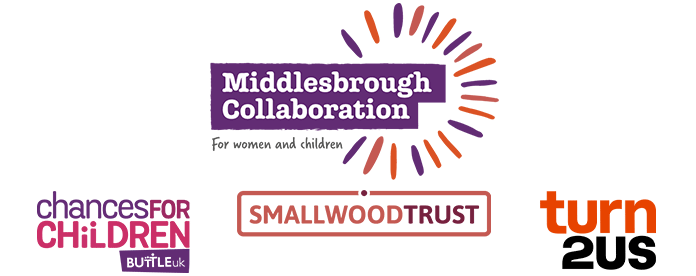
About the co-production partners
The sixteen local women (co-production partners) were mainly from African, Indian, and other South Asian backgrounds. They all had children aged between five months and 22 years old, and had firsthand experience with financial insecurity, having lived experience of the asylum and migrant systems.
The women were very diverse, with the youngest to eldest aged 50 years apart, with different levels of English, education and work experience.
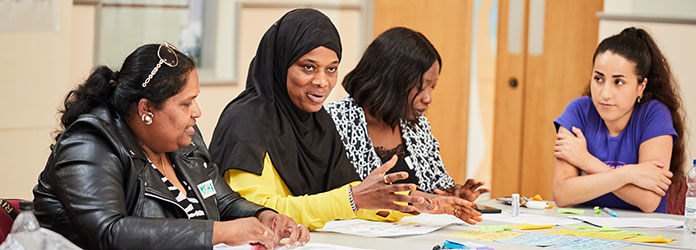
Introduction
Phase 1: Co-production with local women and community partners
From January to July 2023, the collaboration had engaged the sixteen co-production partners and community partners Ubuntu Multicultural Centre and Creative Minds Middlesbrough to design a local grant fund and evaluation methods.
Through seven half-day workshops, the group designed the grant fund, began to plan the Systems Mapping project, and designed methods to evaluate and learn from the grant experiences.
Phase 2: Systems change mapping project
We knew that our grant fund would not be enough to end gendered poverty and we needed to look at the systems that cause gendered poverty in Middlesbrough and think of solutions to it.
To do this we worked with many of the women who co-produced the grant fund with us in Phase 1 and some of the women who received the grant to hear about their experiences of gendered poverty and map solutions to co-create a plan for change in Middlesbrough.
Between November 2023 and March 2024, we ran a project focused on creating a community-led plan for change in Middlesbrough. Through five workshops facilitated by Anj Handa of Inspiring Women Changemakers, the group outlined desired changes, identified controllable factors, and planned engagement strategies.
Built on insights from the grant fund co-design, this phase aimed to highlight and better understand the systemic causes of gendered and child poverty in the Newport ward area of Middlesbrough, such as housing, childcare and availability of work opportunities, and to discuss a vision for the future.
Timeline
- Autumn 2021: Collaboration between Buttle UK, Smallwood Trust and Turn2us established and a programme of grantmaking and systems change agreed.
- February - March 2022: Programme Manager hired, Middlesbrough is identified as key area for the delivery of the programme and Middlesbrough programme on Gendered Poverty is launched.
- August – November 2022: Community Partners, Ubuntu Multicultural Centre and Creative Minds Middlesbrough, selected to be delivery partners.
- January – July 2023: Grant fund co-designed with co-production partners and community partners.
- August 2023: Community Coordinator appointed.
- September – December 2023: Grant round 1 delivered (£50,000 to 25 women with children).
- January – March 2024: Grant round 1 evaluation conducted.
- November 2023 – March 2024: Systems change mapping project delivered.
How we ran the workshops
We asked our co-production partners what themes were important to them and designed sessions around these themes.
We worked with a facilitator to design and deliver workshops that built trust in the group, created a safe space for discussing our experiences and helped to understand the systems that contribute to gendered poverty.
Each session included an interactive exercise, designed to be fun and focused on ways in which they could influence change within the systems that hold them back.
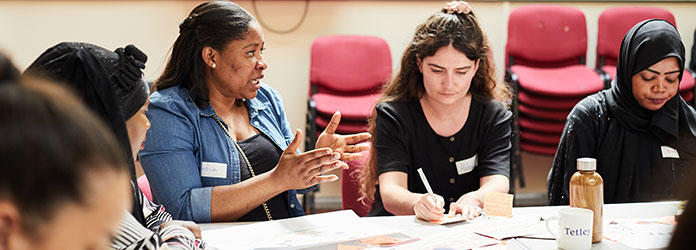
Workshop 1: What do you love about Middlesbrough?
At the start of the first workshop, the women agreed how they would work together through a group agreement. This agreement was formed using headings proposed by the facilitator, which were then tweaked through group discussions. Principles of the agreement included respect, confidentiality, and timekeeping.
Our group agreement
A group agreement allows you to talk about your needs and share what you would like to experience when working with others in a group.
Reliability
It is okay to miss sessions (life happens). If you can’t make it, let the group know. We would really like it if others arrived on time. Turn2Us will tell you two weeks before every workshop so you can arrange childcare or other needs.Turn2Us give you the notes after every session.
Confidentiality
Do not share information or experiences that are not yours to share (e.g. I would really like it if nobody shared my comments outside the group).
Teamwork
We are working as a team and everyone should participate in the way they feel most comfortable. Turn2Us will offer different ways for you to engage in the sessions.
Cultural influences
Do not make assumptions. Remember that our values, beliefs, backgrounds and life experiences influence us and that we all see the world through different lenses.
It’s about your own personal experiences and beliefs. Not everyone who belongs to your community will discuss, feel, or think about subjects in the same way as you.
In this workshop, the women were asked what they loved about Middlesbrough and what was missing for them and their children.
First, we asked:
“What was loved about Middlesbrough?"
We learned:
- Good public transport (fares are reduced during school holidays).
- Lots of parks.
- Strong sense of community.
- Local charity organisations and community places – can offer a variety of help.
- Schools and university.
- Facilities for physical activities e.g. gyms.
- Hospital and health care.
We then asked:
“What’s missing? What don’t you like?”
We learned:
- Hate crime, litter and anti-social behaviour.
- Lots of shops are closing or being moved outside of the town.
- We miss our families back home.
- Safety – police do not respond quickly.
- Lack of soft play areas.
- Lack of childcare.
- It’s not easy to get a job and limited opportunities are offered by Jobcentre Plus.
- Lack of social housing.
- Limited access to different types of food. Lots of fast food which is expensive and unhealthy.
- Access to information – knowing where to go for support.
- Lack of representation in positions of power.
The women made individual collages on canvas board to depict what they loved about their town. They then had a discussion on the causes of gendered poverty based on their collages.
From the discussions, several areas that the women wished to focus on were identified:
- Food (covered in workshop 2).
- Health and wellbeing of women and children (covered in workshop 3).
- Jobs and skills aspirations for women and children (covered in workshop 4.
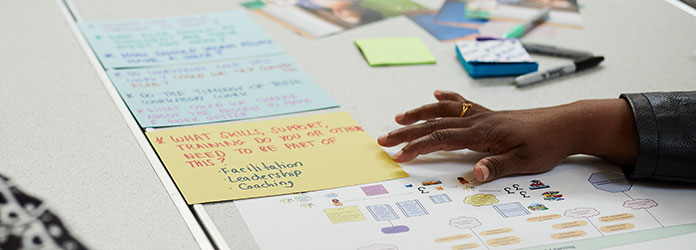
Workshop 2: Food
In workshop 2, we asked
“What foods do you like to cook? How do you access them? What do you do if you can’t?
We learned:
- There is a lack of access to cultural food and the shops that sell these items typically only accept cash but the collaboration pays them for their participation with vouchers.
- The buildings that partners are in host ‘eco shops’. These ‘eco shops’ offer five items for five pounds but stock a limited selection of food (mostly tinned and dried goods, typically ‘Western’ foods).
- The women do not always know which shops stock the kind of food they want.
- They would like to access community gardens but do not know where these are located.
- Women had sometimes got together with others to set up bulk-buying arrangements of traditional food but this is not always practical as they lack places to store the food.
Their solutions for getting and making the food they like included:
- Searching online and buying in bulk.
- Ordering from other cities including Newcastle, Leeds or London. Coordinating or arranging group orders.
- Growing herbs at home. Don’t necessarily need a garden, you can plant them in a pot and put it at the windowsill.
- Asking relatives or friends to bring food from home countries.
- Organising mobile sellers to come to the community.
- Information sharing – knowing where to shop and what different shops sell.
Workshop 3: Health and wellbeing of women and children
In workshop 3, we asked:
“How can children in Middlesbrough thrive? What would help you to help them?”
We learned:
- The women were concerned about what their children are doing between the school gates and home and online.
- There is a tug of war between British life and retaining their cultural values as their children are second generation immigrants. The mothers feared their children are losing their cultural roots.
- They lack informal childcare arrangements from family (who live in other countries) or close friends (they are growing their networks of friends).
The group identified different areas that are all important to children thriving, all of which can be impacted by financial insecurity. These included:
- Making sure children are kept safe when using computers, mobile phone etc through device supervision.
- Physical safety and digital monitoring of older children.
- Wellbeing and supporting their children’s mental health.
- Setting boundaries / routines / limits.
- Chat with children and teachers (communication is important).
- Peer influences and interaction and cultural influences.
- After school and weekend activities.
- Healthy eating, cooking from scratch / cultural food – cooking together and teaching children how to cook healthier meals.
We then asked:
“What is missing for you or your children?"
They said:
- Our family in our home country.
- Children’s playgrounds and soft play.
- Clean play areas.
- Reimbursement for school bus costs is slow.
- Housing - Local Authorities leave places empty, and repairs are slow and bad quality.
- Education during school holidays and tutoring.
- Number of schools - small numbers of places make it a challenge to get kids into school.
We also discussed how they can better support their children. Suggestions included:
- More signposting to support services, and being less scared of talking to them.
- Accessing outside support e.g. Early Help.
- Developing parental skills.
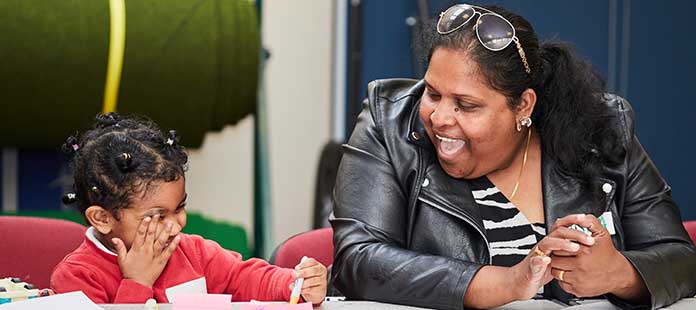
Workshop 4: Jobs and skills
In workshop 4, we asked:
“How could jobs and skills be improved so you your children can thrive?”
Many of the group had trained in different professional fields but were unable to work in those roles in the UK. The barriers to accessing their dream jobs were:
- Childcare.
- Lack of available flexible jobs in Middlesbrough (that were flexible for childcare).
- Knowing where to look for jobs and job security (e.g. zero hours contracts).
We asked:
“What skills can you use in the workplace?"
The women identified a range of transferable skills and attributes they thought would be useful, such as:
- The confidence to set and maintain boundaries.
- English language.
- Behaving respectfully – respect is for everyone.
- Cultural influences.
- Respect for people’s privacy -confidentiality.
- Teamwork.
Next, we asked:
“How can you and your children develop workplace skills?”
They said:
- CV writing and interview skills would be beneficial.
- Peer groups for job application and interview support would also help.
- Volunteering is not typically a route to work in the home countries of the women, but they recognise its value in the UK.
- Encourage children to follow their dreams.
- Stay true to yourself and be confident.
- Wear professional clothing for work.
- Follow workplace protocols.
- Workplace etiquette.
- Set goals for yourselves.
We also discussed their barriers to work, which included:
- Not having English as the first language.
- Childcare is an issue.
- Opportunities in Middlesbrough and from Jobcentre Plus are quite limited.
- Shift patterns are sometime a challenge.
Next we asked:
Who can support you with jobs and skills opportunities? What support is available in Middlesbrough?
They suggested:
- Jobcentre Plus.
- Careers advice (in person or online).
- Skills development/ CV help via Middlesbrough Community Learning, Hope Foundation, NHS Volunteers Programmes.
- Middlesbrough College – accessible by most in Middlesbrough.
- Community groups/ charities.
- Family and friends – support with flexible, informal childcare.
- Women-led volunteering or workplaces.
- Asking for feedback in any recruitment process.
- More flexible work.
- Utilising school career advice opportunities for children.
- Peer support groups it can build confidence knowing that people believe in you.
Workshop 5: Review, evaluate and celebrate
In workshop 5, the group reflected on the impact of working together, and what was the most significant change? We asked the women to turn to the person next to them and describe how they viewed them, using one word.
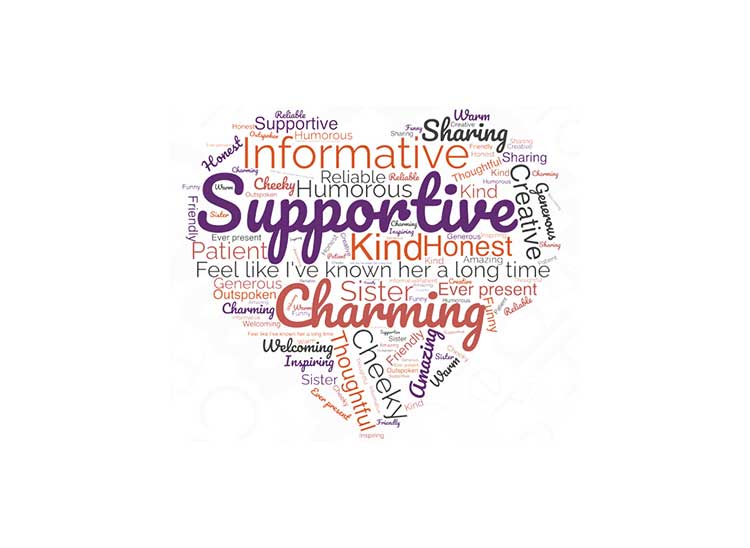
We are sisters. We are not two separate organisations. We have come together.
What we learned
The project has been an excellent knowledge-sharing experience for everyone involved. The women valued the connections that they made.
They also valued the practical tips they shared with each other, which ranged from digital tools to monitor their children’s use of devices; to information about support organisations; to where to source the best traditional foods. Working together allowed them to articulate the causes of gendered and child poverty.
It was clear that more needed to be done to ensure that women were aware what funded support was available to them and their children. While there was commonality in the barriers the women experienced, some of these could be improved by providing more information but many are more systemic.
These barriers are real and hold women back locally and nationally as they do not always know how to access relevant support.
Insights included:
- The women were distrustful of systems such as social services.
- The lack of availability of cultural food affects their ability to make healthy food at home.
- They lack support networks and miss family who live in other countries - projects like these help them to build connections, relationships, and knowledge.
- It’s difficult to get childcare and offering to pay for childcare is not enough if there aren’t any available/ people don’t trust to use it.
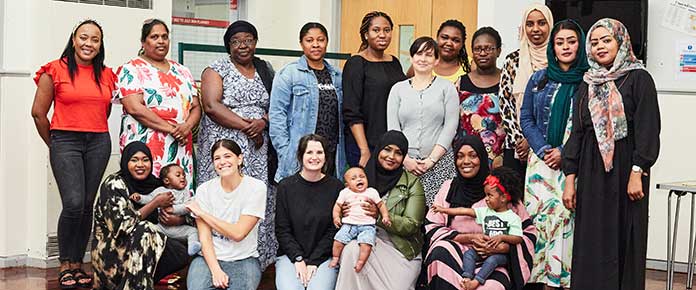
Conclusion
We knew that it would not be possible to delve deeply into systems change in just five short sessions.
Consequently, many of the suggestions focused on working within the existing system. However, the women identified some interventions that they thought would help tackle the issues they face. These included:
- Food: Create a map of community gardens and shops selling cultural foods in and around Newport.
- Childcare and parenting Skills: Identify and engage local providers offering culturally sensitive parenting skills classes.
- Jobs and skills support: Establish a peer mentoring scheme for job searches and applications.
- Access to healthcare: Form links with local GP surgeries.
Next steps for the collaboration and the programme
This report is a resource for the community organisations and women to own. It will serve as a foundation for future discussions with partners and decision-makers. Moving forward, we will:
Share and select 2-3 projects
- Share the focal areas identified by the women with Ubuntu Multicultural Centre and Creative Minds Middlesbrough.
- In collaboration with the women, select 2-3 ideas to transform into actionable projects.
Engage key stakeholders
- Identify key local stakeholders to engage in the setup and delivery of these projects.
Continue to map systems
- Identify local partners who can support in the organisation of regular meetings and knowledge sharing with stakeholders to discuss current challenges, share insights, and devise solutions.
The role of the collaboration
As well as working with local partners to develop long term solutions to gendered poverty we will also:
- Identify ways to support local organisations and women through grants.
- Help local partners develop their understanding of and access to information on national and local services including welfare benefits where applicable and reducing shame and stigma so women can receive the support they need.
- Work with local partners to reduce the stigma around asking for help and discussing financial insecurity.
- Explore how we can best support the women and organisations in implementing the selected projects, such as identifying and connecting them with local public service providers or decision-makers.
- Review the Health and Wellbeing and Anti Poverty strategy for Middlesbrough to identify potential partners to better support migrant communities.
- Use the issues highlighted in this report to inform the programme’s Theory of Change.
By taking these steps, we aim to create an environment where change can begin, empowering women and communities in Middlesbrough to effectively address gendered poverty.
We extend our gratitude to our co-production partners, and community partners, Ubuntu Multicultural Centre and Creative Minds, for generously sharing their insights and experiences on the systems that contribute to financial insecurity for them, their families and their communities.
Further reports from our Middlesbrough collaboration
An evaluation of our co-produced grant fund for women and children